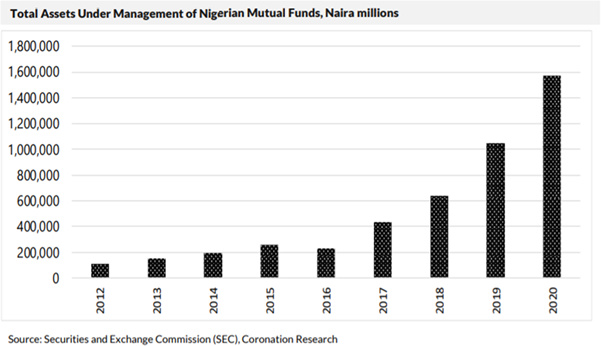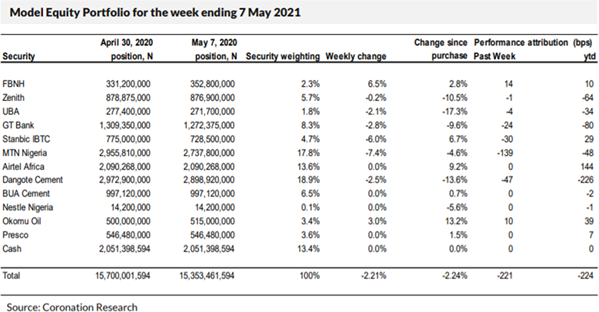Tuesday, May 11,2021 / 2:27PM / by Coronation Research / Header ImageCredit: Titan FX
Tomorrow we publish our report on the Mutual Fund (CollectiveInvestment Scheme) industry. The total assets under management (AUM) ofNigeria's Mutual Funds grew by 50% last year to N1.6 trillion. Yet we havefound that it is difficult, not to say impossible, to get comparableperformance data for the unit prices (UP) of Fixed Income Funds. Surely, thisneeds to be resolved?
FX
Last week the exchange rate in the Investors and Exporters Window(I&E Window) weakened by 0.08% to close at N410.33/US$1. In the parallel(or street) market, the Naira strengthened by 0.41% to close at N483.00/US$1.The Central Bank of Nigeria's (CBN) FX reserves fell to US$34.73bn, a loss of0.42% on the week. In line with our stated expectation, the CBN, on Wednesday,extended its Naira 4 Dollar scheme indefinitely. The CBN did not give reasonsfor the extension and has not released new data on remittance flows. However,we believe the policy may have started to bear fruit. Nonetheless, persistingFX illiquidity in the NAFEX and I&E Windows, and the parallel market rate'sweakness still suggest that pressure on the I&E rate is likely to continue,in our view.
Bonds & T-bills
Last week, bearish sentiment persisted in the bond market as thesecondary market yield for an FGN Naira-denominated bond with 10 years tomaturity rose by 65bps to 13.31%, the yield on the 7-year bond rose by 67bps to13.10%, while the yield on a 3-year bond rose by 110bps to 12.06%.
The annualized yield on a 328-day T-bill in the secondary marketfell by 1bp to 8.04%, while the yield on a 312-day OMO bill fell by 28bps to9.90%. At the close of the week, the average benchmark yield for T-bills roseby 12bps to close at 4.86%, while OMO bill yields rose by 48bps week-on-week,on average, to close at 8.39%. The Treasury Bills market remained bearish dueto persisting tight system liquidity.
We expect the CBN to hold an open market operation (OMO) auctiongiven the OMO maturity of N90bn (US$220m) this week. The Debt Management Office(DMO) is scheduled to offer N117.6 billion at the Treasury Bill (T-bill) primarymarket auction (PMA) this week. Amidst tight system liquidity, we expect yieldsto close higher than two weeks ago, with the annualised yield for 364-day paperlikely to surpass 11.00% (it was 10.80% at the last PMA on 28 April, with astop rate of 9.75%).
Oil
The price of Brent crude rose by 1.53% last week, closing atUS$68.28/bbl, meaning a 31.81% increase year-to-date. The average priceyear-to-date is US$62.67/bbl, 45.00% higher than the average of US$43.22/bbl in2020. Oil prices rose after a cyber attack shut down a US pipeline operatorthat supplies oil to the east coast of the US. The disruption comes as theaccelerating COVID-19 vaccine rollout improves the demand outlook. However, wenote that fresh outbreaks of the virus have led to extensions of restrictivemeasures in some countries. India, in particular, continues to deal with adeadly second wave of the virus, which has led to lockdowns in its major citiesand led to a US$39.5bn reduction in oil imports in April
Equities
The Nigerian Stock Exchange All-Share Index (NSE-ASI) fell by 1.60%last week, bringing the year-to-date loss to -2.66%. Access Bank +11.64%, Seplat+8.77%, Cadbury Nigeria +7.69%, and BUA Cement +7.15% closed positive lastweek, while MTN Nigeria -7.38%, Lafarge Africa -7.22%, and Stanbic IBTC -6.00%closed negative. Across sectors, performance was mixed as the NSE Oil and Gasindex led the gainers for the week with +5.98%, followed by the NSE ConsumerGoods +0.62% and NSE Banking +0.62% indices, while the NSE Insurance -2.20%,NSE-30 -1.94%, and NSE-Industrial Goods -1.60% indices closed negative. It isworthy of note that 11 Plc (formerly Mobil Plc) has been voluntarily delistedfrom the NSE and is now listed on the National Association of SecuritiesDealers (NASD) OTC market where its shares will still be tradable. Followingthe end of the Q1 2021 earnings season, we expect market activity to remainquiet in the absence of catalysts. Investors are expected to continue to watchyield movements in the fixed income space and this is likely to affect theirappetite for equities, in our view.
Comparing Mutual Funds, Apples and Oranges
The Mutual Fund industry in Nigeria is growing fast. The totalassets of the Mutual Fund industry in Nigeria grew by 50% in 2020, to Naira 1.6trillion. Yet this is only 14% of the size of the much larger Pension Fundindustry. So, it needs to keep growing to become a financial force. What is theexperience of an ordinary investor trying to buy into a Mutual Fund?
We went through the experience of an ordinary investor looking tobuy units in a Fixed Income fund. We compared the reported Unit Price (UP) performanceof 17 different Fixed Income funds operating throughout 2020, even though pastperformance is not necessarily a guide to future performance. We found that theUnit Price data, which is supplied by the Funds/Fund Managers themselves, isnot comparable. Differences in reported performance are too large to beexplained by differences in underlying performance in 2020 (2020 was a verygood year for FGN bond prices). Instead, the differences come from the factthat funds report Unit Prices in different ways.
We gathered fund factsheets, held phone calls with sales staff,visited offices, and then examined how funds report their investments fromtheir factsheets and from prospectuses (where these were supplied). We foundtwo kinds of different reporting. Some funds use Mark-to-Market Accounting,meaning they report the market price of the bonds which they hold. This canmean that Unit Prices (UP) are volatile when interest rates change, and bondprices rise and fall. This happened in 2020 and is happening in 2021. Otherfunds use Amortised Cost Accounting, which smoothes out the price performanceof a fund. Some use a mixture.
A third issue is the Guarantee. Some funds guarantee theirinvestors a return (they even have it in their name). This means that they mayseek to avoid Mark-to-Market Accounting because Mark-to-Market Accountingintroduces volatility in Unit Prices (UP), and volatility looks like risk.However, the fact is that market risk exists anyway, no matter how you accountfor it.

If Nigerian funds want to play in the international leagues, theyneed to adopt Global Investment Performance Standards (GIPS). Very few Nigerianfund managers apply GIPS at the moment and Mark-to-Market Accounting is one ofthe cornerstones of GIPS.
Global investors have access to data on thousands of funds acrossthe world, and thanks to the adoption of GIPS, the data is comparable. And itis free. Anyone can use the Morningstar and Financial Times websites to comparethousands of funds.
The first step is to harmonise reporting among Nigeria's MutualFunds. GIPS has to be a long-term goal because introducing GIPS is expensiveand takes time to enforce. Harmonising the reporting of Nigeria's Mutual Fundsis a necessary step to creating comparable UP data and helping the industry toachieve its potential.
Model Equity Portfolio
Last week the Model Equity Portfolio fell by 2.21% compared with a fall in the Nigerian Stock Exchange All-Share Index (NSE-ASI) of 1.61%, therefore underperforming it by 60 basis points. Year to date it has lost 2.24% against a loss in the NSE-ASI of 2.66%, outperforming it by 42bps. Such underperformance in a week (albeit a short week of four trading days) ranks as one of our worst, and is a concern.

To be brief, our notional overweight in the bank sector (a notional22.8% position against an index weight of 16.7%) cost us 44bps last week. Thiswould have been worse - the notional banks position would have lost 58bps -were it not for our 2.3% notional position in FBNH which earned us 14bps. Atleast we made a little notional return by not turning against the stock overits recently-reported corporate governance issues, believing instead thatidentifying and sorting our corporate governance issues is a positive step.
However, there were bigger forces at work. We do not have anotional position in oil producer Seplat, which is an error, given that thestock is rebounding and is a clear beneficiary from strong oil prices. Seplatrose 8.8% last week and it is 1.8% of the NSE-ASI, so we missed 14bps ofperformance.
There were mark-downs for dividends and the week was a shorttrading week after the holiday on Monday 3 May, so it is important to keepthings in perspective. All the same, our Model Equity Portfolio requires newideas. We will add Seplat and, among the insurers, Custodian Allied Insuranceand AIICO to our list of notional positions, bearing in mind that insurancestocks tend not to be liquid and so creating notional positions (we respectmarket liquidity) may be difficult. And we will consider our stance on banks
Relatedto Coronation
1. Transparencyand Foreign Direct Investment
3. NairaBonds Sell-Off, US Bonds Rise
6. MonetaryPolicy Rate Decision
7. Inflationand Interest Rates
8. The US 10-Year Bond andNigeria
9. T-Bill Rates HeadingTowards 10.0%
10. Q42020 GDP and the Implications for Markets
11. Eurobondsand Foreign Financing
13. NigerianGDP Better Than Thought
16. Interest Rates on the Rise
17. Oil Above US$50.00 per Barrel
20. CBN Likely to Leave MPR at 11.50%
21. Second-best Equity Market in the World
22. TheBiden Effect
23. US Dollar Eurobond Yields Now HigherThan Naira Yields?
24. Fiscal and Monetary Response toEvents
25. Winners and Losers in Africa
26. The Return of the Equity Market
27. Which Way for Interest Rates?
28. Coronation Research Releases Report Themed: From Savings toMutual Funds
29. A Case of Eurobond MarketContagion
31. The Policy Mix and The Markets
32. The Oil Price and ProductionParadox
33. Cracks In The Bond Market?
34. No Big Change in FX Policy
35. Coronation Research Releases Outlook for Insurance Sector -From Lagoon To The Blue Ocean
36. Micro-Insurance, Tech, Key toDeepening Nigeria's Insurance Sector - Coronation Research
37. Navigating the Capital Market:The Investors' Dilemma
38. Market Interest Rates Back Up- Coronation Research
Related News
1. Gross FederallyCollected Revenue Stood at N807.54bn in January 2021
2. Non-oil ExportsProvisionally at USD230m in January 2021
3. Salvaging theManufacturing Sector
4. Ecobank Partners NiDCOMto Mobilise Nigerians Abroad for National Development
5. Who Benefits fromElevated Insecurity? - Nobody! - LBS Executive Breakfast Session - May 2021
6. April 2021 HeadlineInflation to Reach 18.77%
7. TotalValue of Capital Importation into Nigeria Stood at US$1,069.68m in Q4 2020 -NBS
8. CapitalImportation into Nigeria Stood At $1,461.49m in Q3 2020 - NBS
9. TotalValue of Capital Importation into Nigeria Stood At $5,854.38m in Q1 2020 - NBS
10. TotalValue Of Capital Importation Stood At $5,820.21m In Q2 2019 - NBS
 Lagos, NG • GMT +1
Lagos, NG • GMT +1











 707 views
707 views











 Sponsored Ad
Sponsored Ad
 Advertise with Us
Advertise with Us









